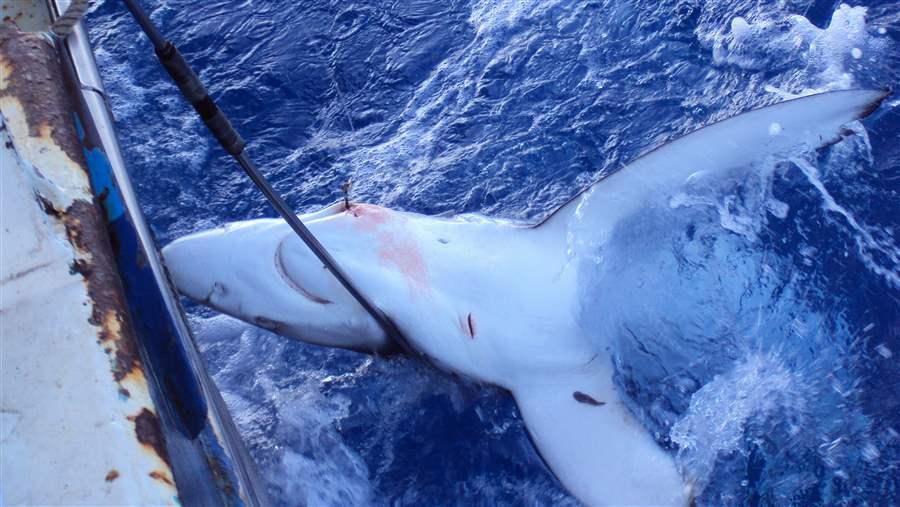Decline in Pelagic South Atlantic Sharks Documented for the First Time
 © Emerson Correia Marques
© Emerson Correia MarquesBlue shark caught by Spanish longline vessel in Brazilian waters. Incidental and targeted fishing has caused a steep decline in South Atlantic shark populations.
Fishing caused a steep decline in South Atlantic shark populations starting in the 1990s, according to a new study. Shark declines are well known in the North Atlantic but had not been convincingly demonstrated in the South Atlantic until now.
Sharks are ecologically important predators and are particularly vulnerable to fishing because of their low reproductive rates. They have long been caught incidentally in tuna and swordfish fisheries. They were targeted directly starting in earnest in the 1980s, often for shark fin soup.
“We suspected that fishery declines and greater regulation in the North Atlantic led many fleets to expand southward, leading to depletion of sharks in the South Atlantic,” said Francesco Ferretti, a study co-author and researcher at Stanford University. The study was supported by the Lenfest Ocean Program.
To estimate trends in abundance of South Atlantic pelagic sharks, lead author Rodrigo Barreto of the Universidade Federal Rural de Pernambuco in Recife, Brazil and his co-authors examined logbook data from the southwestern Atlantic from 1979 to 2011. In all, more than 870,000 sharks of 13 species of pelagic shark were reported caught by longline fishing gear, although information was missing for more than half the vessels. Logbook data are not ideal for estimating trends in abundance, but the researchers were able to address a number of the challenges. For example, they discarded the zero values, which are not reliable, and corrected for the resulting skew in the data.
They found that after a period of moderate fishing in the 1980s and part of the 1990s, shark catch rates declined precipitously from the late 1990s to the late 2000s—by more than 85 percent for most species. This was very likely due to a decline in shark abundance, since there were no regulations or other incentives that would have reduced catch. According to the authors, two species have dwindled enough to be considered endangered—shortfin mako and silky sharks.
“We believe that this pattern is characteristic of a global phenomenon of fleets moving from the well-monitored but overexploited waters of developed countries to the less regulated southern oceans,” Ferretti said.
Sharks fall under the purview of the International Commission for the Conservation of Atlantic Tunas (ICCAT), which requires fishing nations to report data on shark catch. This has led to improvements, but enforcement is still patchy.
“The ICCAT, especially since 2004, has directed some attention to oceanic sharks, but our results indicate that these actions are not enough,” Barreto said.
“We also believe ICCAT must fundamentally improve data collection and put pressure on nations that historically have not reported their catches,” he said. “And we are very concerned by the end of systematic data collection in Brazilian waters in 2012, and about the cancellation of onboard observer programs. Brazil is currently the largest consumer of shark meat, and onboard observers are fundamental to understanding how these fisheries are impacting sharks and other species in the area.”
The study appears in the peer-reviewed journal Conservation Biology and was also supported by the Coordenação de Aperfeiçoamento de Pessoal de Nível Superior, a foundation within Brazil’s Ministry of Education, CAPES and FACEPE.


